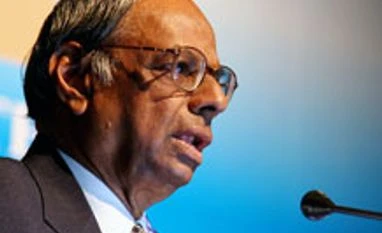The Prime Minister's Economic Advisory Council (PMEAC) on Friday projected the investment rate to decline to 34.7 per cent in FY14 against 35% in the previous year. Council chairman C Rangarajan tells Somesh Jha & Indivjal Dhasmana that investment sentiments will improve once growth picks up. Edited interview:
Your economic growth projections at 5.3 per cent for FY’14 look ambitious compared to brokerage firms which predicted a sub-5 per cent growth.
We have projected the growth rate for non-agricultural sector at 5.4 per cent against 5.5 per cent of last year. But we take into account that agriculture is growing strongly and, hence, taking both into consideration we can say the growth can be 5.3 per cent, which is reasonable.
The numbers related to industrial production do undergo a change with respect to capital goods; the number changes month to month. In one month, this is negative and in another, this is positive. Hence, there is some problem with respect to data. But on the whole, it does give an indication that several sectors of the economy have picked up. There is a positive growth in basic., capital and intermediate goods. It is only in consumer durables that there is negative growth. The indication is the growth rate will become positive in the coming months.
Many industrialists, including Ratan Tata, have gone on record to say India is losing the confidence of the world. The Land Acquisition Bill has drawn flak from various investors. What do you have to say about all this talks?
As far as foreign investors are concerned, I’ll say FDI is running higher in the first four months of this financial year than in the corresponding period last year.
On domestic investor, there are several factors that have factored in weakening of investment sentiments. I believe the sentiments will pick up once growth is back on track. That will be a major factor contributing to reversal of sentiment. There are many Bills that have been passed, though industrialists have to make adjustments to the legislation. Parliament has to meet multiple objectives.
There is a need to satisfy interest of farmers, land owners, industrialists and foreign investors. Hence, a balance has been struck. But I do believe industries will work within this framework.
Do you expect a cut in planned expenditure to check the fiscal deficit to 4.8 per cent of GDP?
It is for the finance minister to decide what they want to do. But I would only repeat what the finance ministry had said that the 4.8 per cent of GDP as fiscal deficit is sacrosanct.
Rating agencies have threatened to downgrade India's sovereign ratings. Do you think there is a case for that?
India’s economic growth rates have fallen but in the context of the global economic situation it is not that bad. Only China has a better growth rate than India among BRICS. There is no case to downgrade India’s rating.
Your economic growth projections at 5.3 per cent for FY’14 look ambitious compared to brokerage firms which predicted a sub-5 per cent growth.
We have projected the growth rate for non-agricultural sector at 5.4 per cent against 5.5 per cent of last year. But we take into account that agriculture is growing strongly and, hence, taking both into consideration we can say the growth can be 5.3 per cent, which is reasonable.
Also Read
Industries grew in July primarily because of spike in growth rate of electrical equipment, a component of capital goods. Economists say this cannot be termed an upturn and we have to wait for 2-3 months to say if this is indeed a revival.
The numbers related to industrial production do undergo a change with respect to capital goods; the number changes month to month. In one month, this is negative and in another, this is positive. Hence, there is some problem with respect to data. But on the whole, it does give an indication that several sectors of the economy have picked up. There is a positive growth in basic., capital and intermediate goods. It is only in consumer durables that there is negative growth. The indication is the growth rate will become positive in the coming months.
Many industrialists, including Ratan Tata, have gone on record to say India is losing the confidence of the world. The Land Acquisition Bill has drawn flak from various investors. What do you have to say about all this talks?
As far as foreign investors are concerned, I’ll say FDI is running higher in the first four months of this financial year than in the corresponding period last year.
On domestic investor, there are several factors that have factored in weakening of investment sentiments. I believe the sentiments will pick up once growth is back on track. That will be a major factor contributing to reversal of sentiment. There are many Bills that have been passed, though industrialists have to make adjustments to the legislation. Parliament has to meet multiple objectives.
There is a need to satisfy interest of farmers, land owners, industrialists and foreign investors. Hence, a balance has been struck. But I do believe industries will work within this framework.
Do you expect a cut in planned expenditure to check the fiscal deficit to 4.8 per cent of GDP?
It is for the finance minister to decide what they want to do. But I would only repeat what the finance ministry had said that the 4.8 per cent of GDP as fiscal deficit is sacrosanct.
Rating agencies have threatened to downgrade India's sovereign ratings. Do you think there is a case for that?
India’s economic growth rates have fallen but in the context of the global economic situation it is not that bad. Only China has a better growth rate than India among BRICS. There is no case to downgrade India’s rating.
)